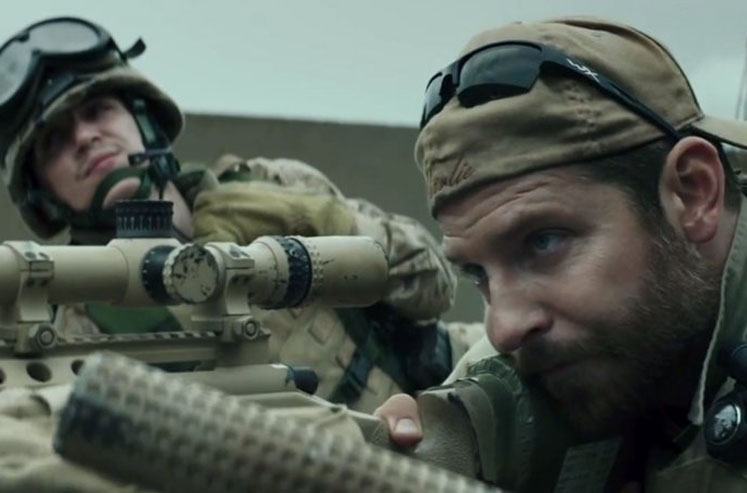The best films about the Iraq and Afghanistan conflicts have been movies that are as concerned about the home front as they are about the field of battle. The latest is Clint Eastwood’s American Sniper, a film based on the life of Chris Kyle, the “deadliest sniper in U.S. history.” Kyle’s real life played out like a movie in its own right. For more on the real Kyle, check out Michael Mooney’s 2013 D Magazine feature here. For the purposes of this piece, though, I’m just going to reflect on the semi-fictional Kyle, played by Bradley Cooper in Eastwood’s new movie.
With American Sniper, Eastwood has used Kyle’s life to take a broader look at what it means to be a soldier. Kyle offers a readymade hero. A down-and-out guy from Texas who, after 9/11, decides to leave the bar and get serious about his life. He joins the Navy and eventual becomes a Navy SEAL. Even though he ends up in the most elite fighting force, importantly, the arc of Kyle’s military career is typical: he is not coming from much and has nothing to lose by signing up. He is driven by a sincere pride of country matched with a strong drive and sense of purpose provided by the military. It also turns out he is a good shot. And he discovers other hidden talents — a razor-sharp focus, fidelity to his fellow soldiers, and fearlessness — that make him uniquely lethal in the field of battle.
Before he’s sent off to war, Kyle meets his future wife, Taya (Sienna Miller), and their relationship helps frame Eastwood’s interest in exploring what it is like to be both a highly trained killer and a husband and (eventually) father. In the field of battle, Kyle is unstoppable. In a number of high-energy action sequences, American Sniper can feel like a well-made, if somewhat rudimentary action flick, replete with some cheesy G.I. Joe-style dialogue. Kyle kills bad guys just at the right time; he leads platoons of grunts into buildings and roots out the bad guys; we watch him get in and out of jams and melodramatic showdowns. Kyle kills to save lives — that much Eastwood wants to make extremely clear with these high-tension shoot-out scenes. Eastwood has to make sure we understand that Kyle’s killing is an act of saving because what makes American Sniper really click is the way it begins to register the weight of just what it means to kill, even when the killing seems to be entirely justified.
As we follow Kyle through successive tours, we begin to see the cost of war on his life, family, and psyche. He is distant to friends and family; he and his wife begin to fight. Cooper does a great job of slowly receding into himself. His speaking turns to grunts, and his posture and demeanor reflect an unspoken, unbearable weight of life at home. Kyle keeps returning for more tours, and he justifies it by saying he can’t stand being at home when he knows his fellow soldiers are in the field of battle. He is good at what he does, and he wants to do it and help his buds. But it also becomes obvious that he suffers from something many soldiers have described about their experience returning from Iraq and Afghanistan. The mundane everyday no longer seems like living when compared to the intense life-and-death reality of the field of battle.
This disconnect is brought together in most dramatic fashion in a scene when Kyle is on a satellite phone with his wife while perched in his sniper’s nest in Iraq. As they chat, a young Iraqi boy is dragged into a square by fighters and executed in front of his family. In the mayhem that ensues, Kyle drops his phone, and his wife stands on a suburban street in Texas listening to the hell of the firefight unfold through her cellphone. The scene is so emotionally wrought, so melodramatic, it almost feels garish and overdone. But at the same time, isn’t this how most of us have experienced these wars, with this paradoxical mix of intimacy and disconnect supplied by modern-day media?
This disconnect seems to be at the heart of what Eastwood is trying to work out in American Sniper. How can someone trained to excel in the field of combat adjust to life after combat? It is an ancient concern of war literature, going all the way back to Homer. Here, Eastwood approaches it through the lens of a society that continually honors and praises its troops, dragging them out to sporting events and sticking bumper stickers on cars, and yet, a society that, at the same time, has never been more insulated to the intimacies and costs of war.
In the end, as we know from everything that has been written about Kyle’s life, there is a gross irony in that he is eventually killed by a fellow veteran. In the movie, Eastwood doesn’t gloss over this tragic twist. Just when it looks like Kyle may be able to come to grips with life after war by mentoring fellow vets, he is killed by someone who can’t overcome his own psychological turmoil. It’s what makes the film’s closing moments, the actual footage of Kyle’s monumental funeral at Cowboys Stadium, both moving and difficult. Yes, we support our troops. We honor our fallen. Our soldiers have done heroic, important work. But as we watch Kyle honored on the Cowboys blue star on the 50-yard line, Eastwood reminds us that we still don’t seem to grasp the real solemnity and human cost of all of it.





